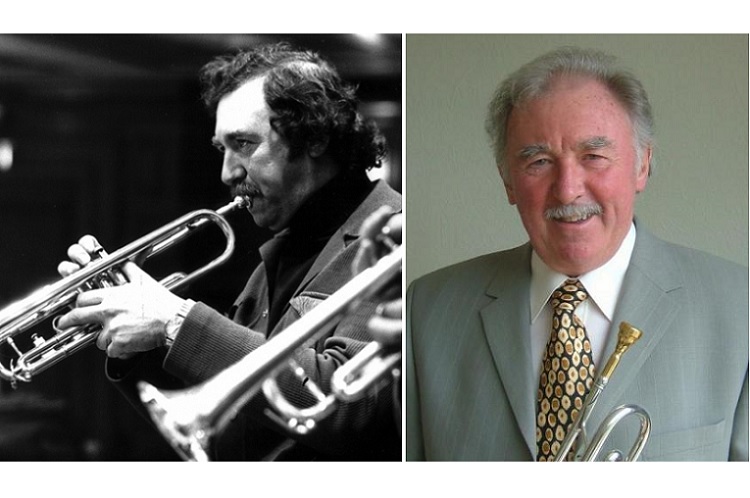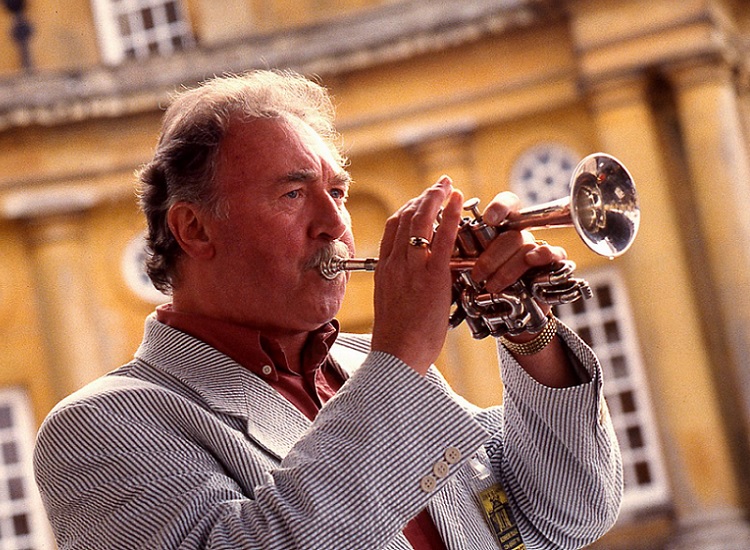
Maurice Murphy
Copyright Image: Lebrecht Music & Arts
25: Maurice Murphy (1935 – 2010)
For a musician who gave the film world “the voice of a hero”, Maurice Murphy was a man who had little time for those who did not appreciate the everyday working requirements of being a professional orchestral player.
His dislike of pretentiousness was legendary, his resultant wit, caustic and biting. He famously ‘shot’ one conductor with a replica Colt 45 after his pomposity hit a nerve.
Stories of his confrontations became urban myths, yet in truth they were borne of a humility and generosity of protective spirit that bonded him closely to the colleagues that he trusted and respected.
His was the sound that defined an era of British orchestral brass playing.
“I’m just another trumpet player, whose been very lucky”, he once said in an interview.
Those who heard him perform, knew he was anything but. His was the sound that defined an era of British orchestral brass playing.
Heraldic spirit
It was the American film composer John Williams who called him “a heraldic spirit”.
It was Williams who found in Murphy (on what his first day on the job with the London Symphony Orchestra), the heroic ‘voice’ that proclaimed the brilliance of the iconic theme to the 1977 ‘Star Wars’ movie.
From that time on, Williams wrote his trumpet parts with him in mind. To him he was Luke Skywalker, Superman, Indiana Jones, Bruce Wayne and Maximus Decimus Meridius rolled into one.
From that time on, Williams wrote his trumpet parts with him in mind. To him he was Luke Skywalker, Superman, Indiana Jones, Bruce Wayne and Maximus Decimus Meridius rolled into one.
He played with a gladiatorial fearlessness – from Mahler to Strauss, Wagner to Messiaen, Bach to Birtwistle. No other trumpet player’s work is more familiar, or repeated, reprised and mimicked throughout the musical world.
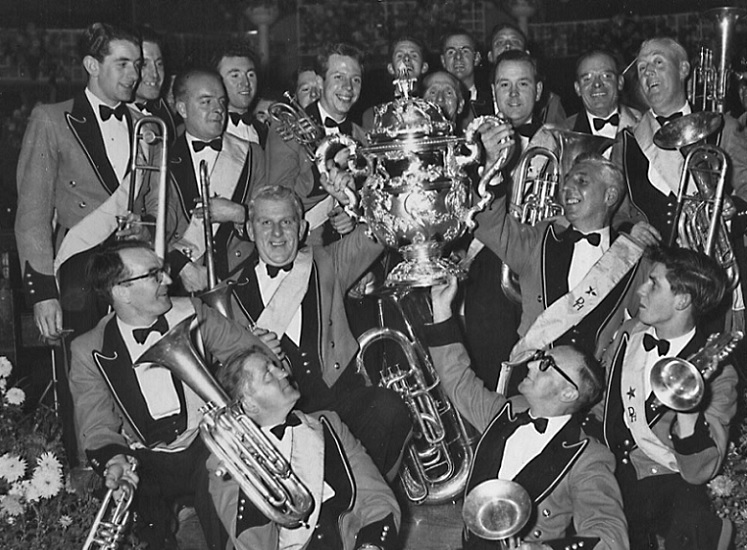
A National winner in 1956 with Fairey
Family roots
Maurice Murphy’s musical journey began in Hammersmith, London, although the family roots were firmly planted in the North East. They returned there when he was aged four. His father drove a coal wagon, and played cornet in the West Stanley Salvation Army.
Aged seven he took his first steps. Initially taught and encouraged by his father, the youngster quickly displayed a precocious ‘natural’ talent, his playing style imbued with a warm lyricism and a remarkable facility for the appreciation of phrasing that never left him.
Initially taught and encouraged by his father, the youngster quickly displayed a precocious ‘natural’ talent, his playing style imbued with a warm lyricism and a remarkable facility for the appreciation of phrasing that never left him.
Taught by Norman Ashcroft (whose musical influence and work ethic made a lifelong impression), Murphy went on to win the Juvenile Class in the All England Solo Championships in 1947, although he had already enjoyed considerable success on the popular solo competition circuit where his talent was both noted and admired by rivals.
Marvellous
Denis Carr, who went onto conduct several leading bands, later recalled: “I entered the Daily Herald solo contest in Gateshead. My brother offered me £1 if a won, 10 shillings if I came second. I felt I was in with a chance of the £1 until a dark-haired lad came on, and after 10 seconds flat my £1 shrank to 10 shillings.
It was Maurice. I thought, my God that’s marvellous. I got an awful lot of second places after that against him. He became my idol. He wasn’t just a cornet player; he was an artist who played the cornet.”
He became my idol. He wasn’t just a cornet player; he was an artist who played the cornet.”
Murphy gained further invaluable experience with Norman Ashcroft at Harton Colliery Band, but when he left to play in the Carla Rosa Opera company he was taught by conductor, Jack Atherton.
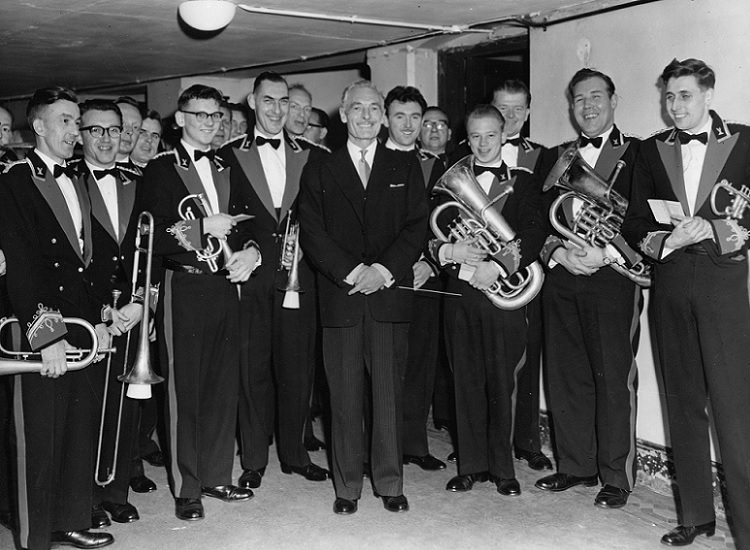
Back at the Albert Hall with Black Dyke Mills Band
Golden tone
In early 1951 Murphy left Harton for Crookhall Colliery to play on the solo cornet bench, but was soon promoted to assistant principal and often played principal and was a regular soloist.
At the National Final in London that year the principal cornet couldn’t face the solo in ‘Epic Symphony’. Murphy stepped up. The adjudicator Frank Wright wrote that the solo cornet had produced “a golden tone which is often talked about but never heard.”
The adjudicator Frank Wright wrote that the solo cornet had produced “a golden tone which is often talked about but never heard.”
A move to Yorkshire saw him join the YEWCO Band – the Yorkshire Engineering and Welding Company – which he later described as, “the dustbin factory band in Bradford”.
He was though the rising star of the post war banding movement, and in 1952 was to become the first principal cornet of the National Youth Brass Band of Great Britain.
Without warning the YEWCO Band folded in 1956 and he moved to Fairey’s to finish his apprenticeship as an electrician. Playing assistant principal to Norman Ashcroft he was part of the 1956 ‘Double’ winning band. He was however turned down for National Service due to a diagnosed minor heart condition.
Black Dyke Mills Band
In March 1957 he was appointed principal cornet of Black Dyke Mills Band, where over the next five years, he sealed his reputation as the leading cornet player of his generation.
At a time when robust, big sounding cornet players were very much the norm, Murphy’s elegant finesse, remarkable dexterity and cultured phrasing stood out like a beacon.
At a time when robust, big sounding cornet players were very much the norm, Murphy’s elegant finesse, remarkable dexterity and cultured phrasing stood out like a beacon.
All consuming confidence
“He played with a nonchalant all-consuming confidence,” Geoffrey Whitham, who played solo euphonium in the band at the time would later say.
“Nothing fazed him. He knew he was the best – and we did. There was nothing he couldn’t do, but he never overdid it. It just wasn’t necessary for him.”
With him at the helm, Black Dyke won the British Open in 1957 and the National in 1959 and 1961.
Later he recalled: “It didn’t worry me at all; I just enjoyed it. It was five years of good fun with one or two good wins at contests too. We had a lot of laughs and made a lot of friends and although I miss the lads, I can’t honestly say I miss the banding itself.”
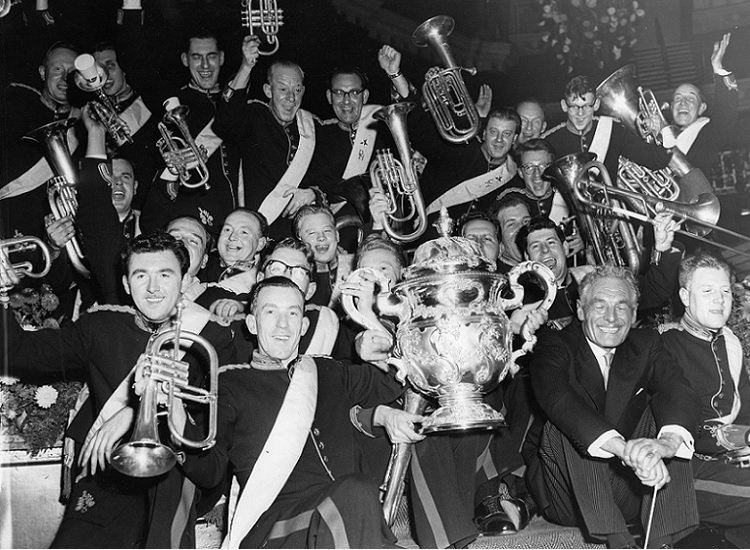
Another National victory
Real deal
Although he would have liked to have stayed in banding a bit longer, a job came up at the BBC Northern Orchestra when Willie Lang moved to the LSO. His name was on their radar, but with no formal musical qualifications some felt he wouldn’t be able to succeed.
“I thought I would like to see what an audition was like,” he later said.
“I don’t know anything about theory, or the rudiments of music and I’m not interested in scales and how many sharps or flats a piece has. They are just all notes, and I transpose note for note by ear.
He was offered the job, but admitted that he had no hope of coping with the reading and the transposition. Thankfully, the second trumpet player was Harold Hall who knew full well that Murphy was the real deal.
“He used to tip me off about looking at the parts with tricky transpositions,” Maurice remembered. “I don’t know anything about theory, or the rudiments of music and I’m not interested in scales and how many sharps or flats a piece has. They are just all notes, and I transpose note for note by ear.
So, when I first started, I used to listen if anyone else had the same figure and then play it by ear. I picked up a lot of transposition from that.”
Better than work
Although he hadn’t deliberately set out to become a professional musician, the path to a career was now before him. He also knew who lucky he was, and never once took it for granted.
“I really couldn’t do anything else,” he said in a later interview. “And in any case, it’s better than work. I tried that too, being covered in oil and grease before nine o’clock in the morning.”
That earthy appreciation of the honest grit and grime of working life never left him – as that pretentious orchestral conductor Meredith Davies was famously to find out.
Colt 45
Rehearsing a symphony he turned to the brass section and complained: "Oh trumpets, that's much too gothic, I need it more Renaissance."
In a clearly audible whisper to Barry Collarbone, his second trumpet, Murphy asked: "Is he talking to us?"
Collarbone replied in the affirmative. "Well, if he talks to us like that again, I'm gonna shoot the f****r!"
Moments later came another criticism: "Oh trumpets, it's too Rembrandt, I need it more Renoir".
Murphy calmly opened his trumpet case and produced a replica Colt 45 revolver, pointed at the startled conductor, and ‘shot’ him. There was no further talk of Rembrandt.
Collarbone replied in the affirmative. "Well, if he talks to us like that again, I'm gonna shoot the f****r!"
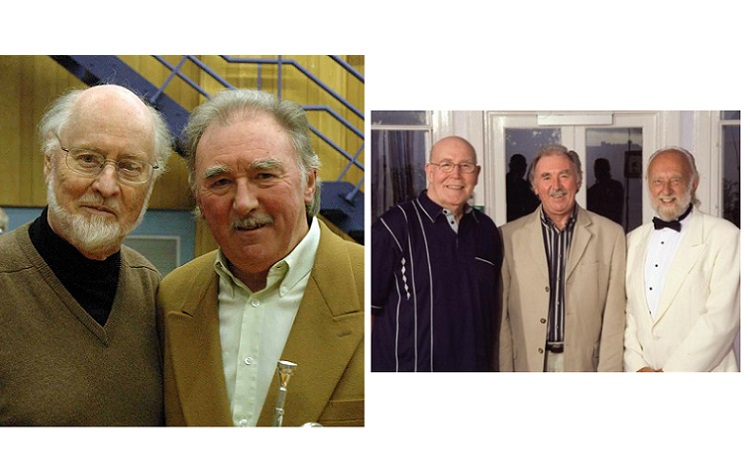
Life long friends: John Williams, Geoffrey Whitham and Richard Evans
No good as a teacher
During his 17 years at the BBC Northern Murphy was asked on countless occasions to return on a regular basis to perform with brass bands as a soloist, but almost always refused.
His job was now as a professional orchestral player – and as he later admitted he was “no good as a teacher” either, after finding great difficulty in explaining “how to play” to students at the Royal Northern College of Music.
In his spare time he said he enjoyed listened to Radio 1 and watching television – his trumpet at his side to pick up and blow in the advert breaks.
Sleepy Angel
When he did return the results were spectacular. In 1968 Black Dyke Mills recorded Gilbert Vinter’s ‘The Trumpets’ – with his ‘Angelic’ playing as stunning as if the Archangel Gabriel had just popped in for a blow from the horse-shoe gallery at Huddersfield Town Hall.
What made it even more amusingly brilliant was that Murphy had played it on a ‘cold’ instrument that he quickly took from the case after being woken up from a crafty kip following a late-night trip up from London by the shouts from conductor Geoffrey Brand.
What made it even more amusingly brilliant was that Murphy had played it on a ‘cold’ instrument that he quickly took from the case after being woken up from a crafty kip following a late-night trip up from London by the shouts from conductor Geoffrey Brand.
Equally stunning was his world premiere performance of the Ernest Tomlinson ‘Cornet Concerto’ at the evening concert after the National Brass Band Championships in the Royal Albert Hall in 1974 – thankfully also recorded for posterity. Even today, the thrilling finale leaves the listener slack jawed in awe.
He later recorded it with the Yorkshire Imperial Band, whilst he also made recording of the Denis Wright ‘Cornet Concerto’ and made a CD of solos with Don Lusher and another with the Leyland DAF Band alongside his lifelong friend, Richard Evans.
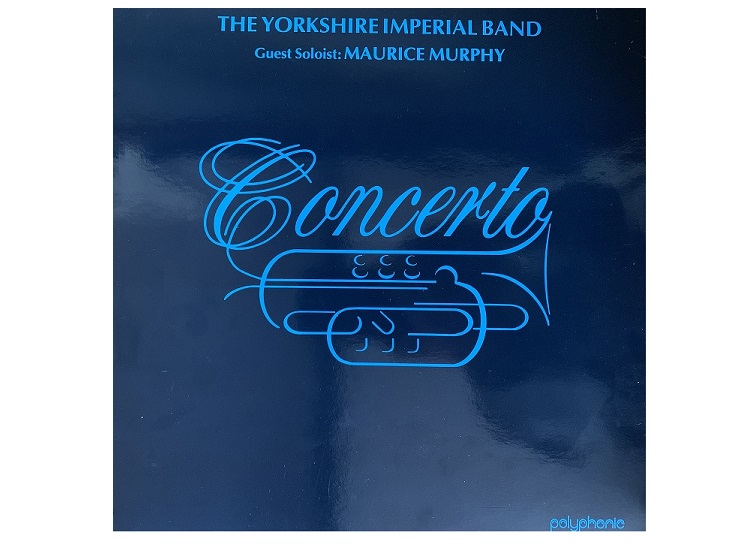
Recorded for posterity with Yorkshire Imps
LSO
In 1977 he was invited to join the London Symphony Orchestra, although with typical blunt workingman honesty he said that “…it was just the money that made me. If I’d got the same money up in Manchester I would never have moved.”
However, as double bass player Gerald Newsom recalled, Murphy brought a new sound and approach to the trumpet section. “He brought with him an enormous new life and energy and almost a modernism. Very clear, very precise.”
Although he has worked with them before in Mexico – his first contract day was the first day of the recording of the opening credits to ‘Star Wars’.
“The first take was the opening credits,” Maurice later said. “The first top C. It was great.”
The first take was the opening credits,” Maurice later said. “The first top C. It was great.”
That ‘diamond sharp’ sound was heard around the world.
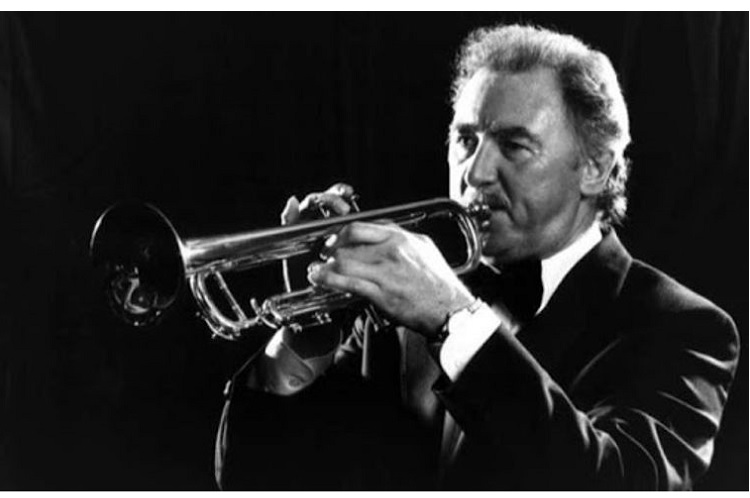
In his prime...
Amazing moment
Composer John Williams was interviewed some years later and said: “You know it was an amazing moment – that blast of brass that opens the film. It was the first sound I heard from Maurice. It was electrifying. It was certainly unique – everyone felt it.
That heraldic spirit is within everything he plays. It created the voice of a hero. Everyone remembers it.”
There was a kind of team roar when he hit it perfectly. He’s gone now, but I love that man.”
In an interview with ‘The New Yorker’ magazine in 2020 he added: "That first day of recording was actually his first day with the orchestra, and the first thing he played was that high C.
There was a kind of team roar when he hit it perfectly. He’s gone now, but I love that man.”
Prime Minister
Writing after Maurice Murphy’s death in 2010, Terry Jones, a horn player at the LSO at the time, also recalled a pre-opening party in the roof garden for the opening of the Barbican Concert Hall in 1982.
“Maurice, myself, Malcolm Hall, Eric Crees and John Fletcher were playing brass quintets to entertain a huge crowd of famous people while they drank their champagne,” he said.
“We'd been playing for what seemed like hours when the former Prime Minister Edward Heath and David Jacobs strolled up.”
There walking through the parting crowd of people was the ex-Prime Minister of Great Britain, carrying a tray with three bottles of Cordon Rouge champagne, followed by David Jacobs and a tray with five glasses.
‘Sounds awfully good’, Heath said, with his trademark grin, to which Murphy retorted: “It'd sound even better if we 'ad a ******* drink’. Before we finished a silly arrangement of 'William Tell' I saw out of the corner of my eye, the sight I've never forgotten, and that always comes to me when I think of Maurice.
There walking through the parting crowd of people was the ex-Prime Minister of Great Britain, carrying a tray with three bottles of Cordon Rouge champagne, followed by David Jacobs and a tray with five glasses.”
Demanded respect
The true story summed up his approach to his working life: It demanded respect. And whilst he himself admitted to never being, “hooked on music and as a far as I’m concerned it’s just a job. If I won the pools, I’d probably nail my trumpet to a barn door or make a table lamp out of it”, he also ensured his reputation was never sullied.
In a television interview after ‘practising’ in between adverts sat on the settee in his living at his home ahead of a performance of the Haydn ‘Trumpet Concerto’ he said: “I don’t get nervous anymore. Most of the time I look forward to doing it actually. I’m enjoying it now. Not worth worrying about.”
I don’t get nervous anymore. Most of the time I look forward to doing it actually. I’m enjoying it now. Not worth worrying about.”
Over the 30 years he played with the LSO, his iconic status as a world class player was sealed.
Conductors from Previn to Bernstein, Claudio Abbado to Sir Colin Davis and Georg Solti praised (and occasionally cursed him) as he led a brass section that as critic Barry Millington said, could play with “blistering intensity” – the focal point the unmistakable ‘heroic’ sound of their principal trumpet player.
Final performance
Although he ‘retired’ in 2000, he stayed for another seven years, before a final performance in June 2007.
In 2008 Maurice Murphy received the honorary award of the International Trumpet Guild given to those, “who have made extraordinary contributions to the art of trumpet playing”.
He was awarded the MBE in the 2010 New Year Honours. He died on 28th October 2010 following complications arising from a serious operation, aged 75.
Tim Mutum
4BR Hall of Fame: No.1: Jack Atherton
https://www.4barsrest.com/articles/2019/1832.asp
4BR Hall of Fame: No.2: Albert Baile
https://www.4barsrest.com/articles/2019/1836.asp
4BR Hall of Fame: No.3: Stanley Boddington
https://www.4barsrest.com/articles/2019/1842.asp
4BR Hall of Fame: No.4: Bram Gay
https://www.4barsrest.com/articles/2020/1848.asp
4BR Hall of Fame: No.5: Leonard Lamb
https://www.4barsrest.com/articles/2020/1855.asp
4BR Hall of Fame: No.6: Arthur Stender
https://www.4barsrest.com/articles/2020/1866.asp
4BR Hall of Fame: No.7: Violet Brand
https://www.4barsrest.com/articles/2020/1871.asp
4BR Hall of Fame: No.8: Eric Bravington
https://www.4barsrest.com/articles/2020/1875.asp
4BR Hall of Fame: No.9: Norman Ashcroft
https://www.4barsrest.com/articles/2020/1879.asp
4BR Hall of Fame: No.10: Albert Chappell
https://www.4barsrest.com/articles/2020/1884.asp
4BR Hall of Fame: No.11: Betty Anderson
https://www.4barsrest.com/articles/2020/1889.asp
4BR Hall of Fame: No.12: Trevor Walmsley DFC
https://www.4barsrest.com/articles/2020/1897.asp
4BR Hall of Fame: No.13: Percy Code
https://www.4barsrest.com/articles/2020/1903.asp
4BR Hall of Fame: No.14: George Thompson MBE
https://www.4barsrest.com/articles/2020/1909.asp
4BR Hall of Fame: No.15: Willie Lang
https://www.4barsrest.com/articles/2020/1914.asp
4BR Hall of Fame: No.16: James Scott
https://www.4barsrest.com/articles/2021/1916.asp
4BR Hall of Fame: No.17: Jack Mackintosh
https://www.4barsrest.com/articles/2021/1922.asp
4BR Hall of Fame: No.18: Teddy Gray
https://www.4barsrest.com/articles/2021/1928.asp
4BR Hall of Fame: No.19: Rowland Jones
https://www.4barsrest.com/articles/2021/1932.asp
4BR Hall of Fame: No.20: Helen Perkin
https://www.4barsrest.com/articles/2021/1944.asp
4BR Hall of Fame: No.21: Lt Col Cecil H Jaeger OBE
https://www.4barsrest.com/articles/2021/1954.asp
4BR Hall of Fame: No.22: Alex Mortimer
https://www.4barsrest.com/articles/2021/1966.asp
4BR Hall of Fame: No.23: Henry Geehl
https://4barsrest.com/articles/2022/1987.asp
4BR Hall of Fame: No.24: Geoffrey Brand
https://www.4barsrest.com/articles/2023/1996.asp



